Abstract
Education innovation requires developing individuals as innovators by cultivating the skills and knowledge needed to translate innovative ideas into tangible, scalable science and health outcomes. To meet this need, we launched an 18-month innovation development program that provides targeted knowledge and skill-building using an experiential learning model. Program curricula focuses on foundational innovation and change management principles intended to guide innovators’ competency development.
Innovators are selected based on the potential impact and scalability of their innovation idea and its ability to translate into improved health or science outcomes. They are also assessed based on their propensity towards seven innovation competencies: creativity, critical thinking, initiative, intellectual curiosity, intelligent risk-taking, teamwork, and visioning. Developing individuals and ideas involves a complementary, two-way process. As individuals develop innovation competency, they are able to apply their new knowledge and skills to progress their innovative ideas. Likewise, the idea development process offers experiential learning that cultivates innovation competency.
To date, ten education innovators have participated in the program. Innovators receive protected time to participate as well as funding to pilot their ideas. Innovators learn new skills and knowledge and apply their learning during monthly workshops. They also receive ongoing coaching and “just in time” feedback, which includes guidance on developing their innovation network. These innovators represent a balanced portfolio of learners, staff, and faculty working at Michigan Medicine to advance health and science by addressing specific education challenges with innovative solutions.

